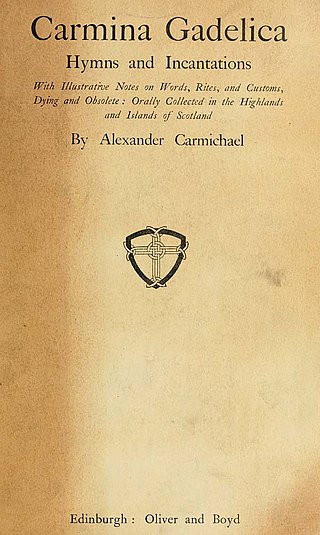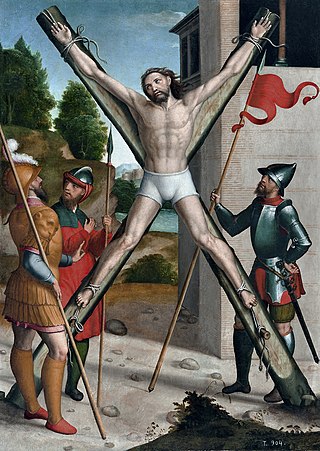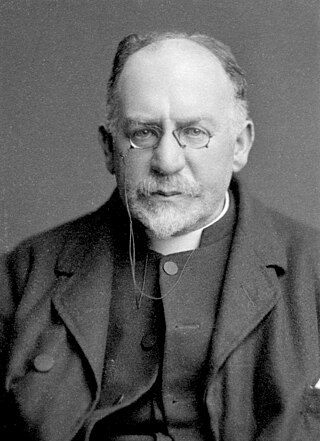Related Research Articles
The Scottish Renaissance was a mainly literary movement of the early to mid-20th century that can be seen as the Scottish version of modernism. It is sometimes referred to as the Scottish literary renaissance, although its influence went beyond literature into music, visual arts, and politics. The writers and artists of the Scottish Renaissance displayed a profound interest in both modern philosophy and technology, as well as incorporating folk influences, and a strong concern for the fate of Scotland's declining languages.

Carmina Gadelica is a compendium of prayers, hymns, charms, incantations, blessings, literary-folkloric poems and songs, proverbs, lexical items, historical anecdotes, natural history observations, and miscellaneous lore gathered in the Gàidhealtachd regions of Scotland between 1860 and 1909. The material was recorded, translated, and reworked by the exciseman and folklorist Alexander Carmichael (1832–1912).
The Free Church of Scotland is a conservative evangelical Calvinist denomination in Scotland. It is the continuation of the original Free Church of Scotland that remained outside the union with the United Presbyterian Church of Scotland in 1900, and remains a distinct Presbyterian denomination in Scotland.

Inverness Royal Academy is a comprehensive secondary school in the city of Inverness in the Highland area of Scotland.
Derick Smith Thomson was a Scottish poet, publisher, lexicographer, academic and writer. He was originally from Lewis, but spent much of his life in Glasgow, where he was Professor of Celtic at the University of Glasgow from 1963 to 1991. He is best known for setting up the publishing house Gairm, along with its magazine, which was the longest-running periodical ever to be written entirely in Gaelic, running for over fifty years under his editorship. Gairm has since ceased, and was replaced by Gath and then STEALL. He was an Honorary President of the Scottish Poetry Library, and a Fellow of the Royal Society of Edinburgh and the British Academy. In June 2007, he received an honorary degree from Glasgow University.

Robert Blair was a Scottish minister and a Gaelic scholar.

The Catholic Church in Scotland overseen by the Scottish Bishops' Conference, is part of the worldwide Catholic Church headed by the Pope. After being introduced through Iona Abbey and firmly established in Scotland for nearly a millennium, the Catholic Church was outlawed following the Scottish Reformation in 1560. Throughout nearly three centuries of religious persecution, several pockets in Scotland retained a significant pre-Reformation Catholic population, including Banffshire, the Hebrides, and more northern parts of the Highlands, Galloway at Terregles House, Munches House, Kirkconnell House, New Abbey and Parton House and at Traquair in Peebleshire.
Matheson is a surname derived from either an anglicised form of Scottish Gaelic surnames or the patronymic form of a short form of the English Matthew. This English personal name is ultimately derived from the Biblical Hebrew מַתִּתְיָהוּ (mattiṯyāhū), which means "gift of God". An early record form of the surname Matheson is Mathyson, recorded in 1392; this recorded name literally means "son of Mathi"—Mathi being a pet form of Matthew. Two different Scottish Gaelic surnames have been Anglicised Matheson. One such surname is Mac Mhathghamhuin, which became Anglicised Matheson on account of its similar sound. This Gaelic surname is of an entirely different etymology than Matheson, as the Gaelic mathghamhuin means "bear". Another Gaelic surname Anglicised Matheson is Mac Matha. This Gaelic surname is derived from the patronymic form of a Gaelic form of Matthew.

Donald Monro was a Scottish clergyman, who wrote an early and historically valuable description of the Hebrides and other Scottish islands and enjoyed the honorific title of "Dean of the Isles".

Lauchlan MacLean Watt FRSE was the minister of Glasgow Cathedral from 1923–34, and the Moderator of the General Assembly of the Church of Scotland in 1933. He was a published poet and author, and a literary critic.

The Chair of Celtic is a professorship at the University of Glasgow, established in 1956 by an endowment from merchant James Crawford, the Ross Trust and the university's Ossianic Society.

Donald MacKinnon (1839–1914), born on Colonsay, an island in the Scottish Inner Hebrides, was a Celtic scholar, the first elected Professor of Celtic languages, literature, history and antiquities at Edinburgh University, a chair he occupied from 1882 to the year of his death in 1914. He is known particularly for his edition and translation of the so-called Glenmasan manuscript, and also catalogued the manuscripts in the Advocates Library collection.
James MacLagan or McLagan was a Church of Scotland minister and collector of Scottish Gaelic poetry and song. His manuscript collection, known as the McLagan Collection, comprises some 250 manuscripts of primarily Gaelic song and poetry collected in the second half of the eighteenth century. The collection includes works by many of the best-known 17th- and 18th-century Gaelic poets such as Iain Lom, Màiri nighean Alasdair Ruaidh and Alasdair mac Mhaighstir Alasdair.

Mackintosh MacKay was a Scottish minister and author who served as Moderator of the General Assembly of the Free Church of Scotland in 1849. He edited the Highland Society's prodigious Gaelic dictionary in 1828.

Prof Magnus Maclean FRSE MIEE MICE LLD (1857-1937) was an electrical engineer who assisted Lord Kelvin in his electrical experiments and later became Professor of Electrical Engineering in Glasgow. The Magnus Maclean Memorial Prize given to students of electrical engineering is named in his honour. A native speaker of Scottish Gaelic, he also lectured in Celtic Studies at the University of Glasgow, delivering the MacCallum lectures, in English between 1901 and 1903. These lectures constituted the first official lectures in Celtic studies at the University.

George Milligan DCL DD was a Scottish minister of the Church of Scotland who served as Moderator of the General Assembly of the Church of Scotland in 1923. He was professor of divinity and biblical criticism at the University of Glasgow.
Angus Matheson was the inaugural Professor of Celtic Languages and Literature at the University of Glasgow, a post he held from 1956 until his death in 1962.
Donald Mackinnon Macalister (1832–1909) was a minister of the Free Church of Scotland who served as Moderator of the General Assembly in 1902/03.
References
- ↑ Archives, The National. "The Discovery Service". discovery.nationalarchives.gov.uk. Retrieved 8 May 2019.
- 1 2 3 4 5 6 7 "William Matheson". The Herald. 2 December 1995. Retrieved 2 December 2017.
- ↑ "Tobar an Dualchais - Biography - Rev. William Matheson". www.tobarandualchais.co.uk. Archived from the original on 20 September 2013. Retrieved 8 May 2019.
- ↑ "Angus Matheson". University of Glasgow. Retrieved 2 December 2017.